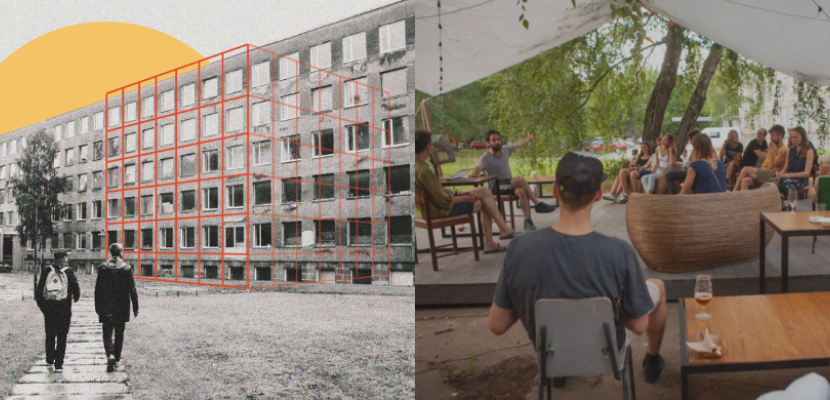
Viskaļi (Institute of Design for Quality of Life)

About this good practice
As a post-industrial city, Riga has undergone a radical economic restructuring over the last 30 years and still has large areas of abandoned space. The Viskaļi initiative is a vivid example of a space that has been given a second chance.
The initiative promoted by the local NGO Free Riga transformed an abandoned Faculty of Riga Technical University (RTU) at Viskaļu iela into a dynamic and purposeful space. In 2020, Free Riga secured a 20-year lease through an auction, making it the largest creative space in Riga, with 15,000 square metres for over 150 creative, social, and active residents.
The building was open for temporary use for the first four years (2021-25), hosting a variety of activities and events.
The long-term plan is to develop, in the building, the “Institute of Design for Quality of Life”, an international innovation platform aimed to provide affordable spaces for projects that improve quality of life and address environmental, social, and welfare issues. The institute plans to gradually develop educational and cultural programmes, artists’ workshops, research centres, facilities for start-ups, micro-businesses, NGOs, co-working spaces, and event spaces.
Currently, the main actors beneficiaries are the residents of the inhabited building – composed by very diverse groups of society (local/international, singles/families, European artists, Ukrainian refugees, vulnerable locals and many others).
Expert opinion
Resources needed
All the resources are generated by the residents, who share costs for utilities and invest their voluntary work in the development of the project. Residents are actively engaged in attracting funding to realise their initiatives related to community-building and new uses of temporary space.
Evidence of success
This practice is successful due to its significant impact on the community. Even if a complete life-cycle assessment initiatives has not been performed yet, the quality of life of the residents has been surely improved. The initiatives promote inclusiveness, entrepreneurship, job creation, and community well-being. Moreover, the successful collaboration with the public sector yielded several cultural and social projects funded by public sources.
Potential for learning or transfer
The Viskaļi initiative in Riga presents an interesting case of urban regeneration and reuse of abandoned spaces in a post-industrial city context. The initial temporary use phase before transitioning into a more permanent institution (the Institute of Design for Quality of Life) showcases a flexible approach to urban development.
It also provides valuable insights on bottom-up initiatives, activating dialogues and mutual understanding with occupants of abandoned buildings, public administrations and citizens.
The case is also relevant for developing a temporary use agency for a metropolitan area, based on the experience of Free Riga.
Further information
Website
Good practice owner
You can contact the good practice owner below for more detailed information.

